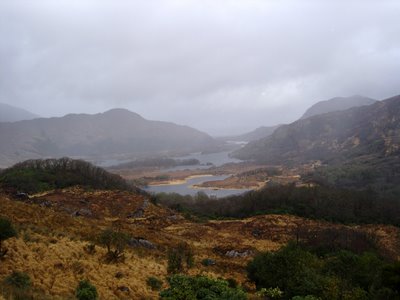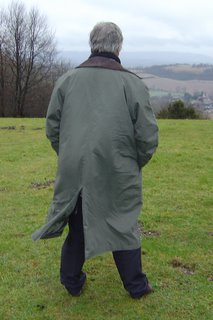 We may sometimes think that the Irish are a bit bonkers, but they in turn must surely wonder at the eccentric behaviour of English tourists.
We may sometimes think that the Irish are a bit bonkers, but they in turn must surely wonder at the eccentric behaviour of English tourists.There we were last weekend, the wife and I and our little hire car, driving for miles and miles around the famous Ring of Kerry in the rain, the mist and the gloom. The weather was just awful, but we persisted - trying to see if we could spot the MacGillicuddy Reeks - Ireland's largest mountain range, and other landmarks for which this circular drive is so famous.
During a short break in the weather we did manage to spot the Ladies View (named apparently after Queen Victoria’s Ladies in Waiting) outside Killarney. Typically when I took the photo above I managed to miss the fine rainbow which had been there a moment beforehand.
At the westernmost point on the drive we diverted briefly and crossed the causeway to Valentia Island where we stopped at a tourist attraction called the "Skellig Experience". This exhibition (plus short film) celebrates the two small rocky islets, lashed by the Atlantic, about 10 kilometres from Valentia - although quite invisible in the ghastly weather. The larger of the two - Skellig Michael - is home to some 27,000 pairs of gannets and a lighthouse. It is also a UNESCO world heritage site, but not because of the gannets or the lighthouse. From 588 to 1222AD the place was inhabited by Irish monks. They created a stairway from the landing point up 200 metres to their stone “beehive” shelters which still survive today. For sheer, bloody-minded remoteness this is an extraordinary place to build a monastery, but as Lord Clark said "It was in places like Skellig Michael that Western Civilization was preserved." George Bernard Shaw described Skellig Michael as "an incredible, impossible, mad place. I tell you the thing does not belong to any world that you and I have lived and worked in; it is part of our dream world." It was sad that we came all this way and failed to see it for ourselves.
For the rest of the "Ring", there was little to be said. I had wanted to take the wife for a jaunting car ride through the Lakes of Killarney, but the weather said no. Muckross House seemed to be closed, and for long periods we followed tourist coaches through interminable, narrow roads. I even failed to appreciate the golf course at Waterville where the older brother distinguished himself on the celebrated 18th hole.


